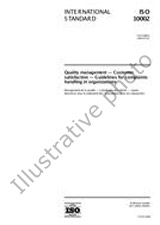We need your consent to use the individual data so that you can see information about your interests, among other things. Click "OK" to give your consent.

ISO/IEC 10164-15-ed.2.0
Information technology - Open Systems Interconnection - Systems management: Scheduling function - Part 15:
Translate name
STANDARD published on 11.12.2002
The information about the standard:
Designation standards: ISO/IEC 10164-15-ed.2.0
Publication date standards: 11.12.2002
SKU: NS-940528
The number of pages: 40
Approximate weight : 120 g (0.26 lbs)
Country: International technical standard
Category: Technical standards ISO
The category - similar standards:
Annotation of standard text ISO/IEC 10164-15-ed.2.0 :
This Recommendation | International Standard defines the scheduling function. The scheduling function is a systems management function which may be used by an application process in a centralized or decentralized management environment to exchange information and commands for the purpose of systems management, as defined by CCITT Rec. X.700 | ISO/IEC 7498-4. This Recommendation | International Standard is positioned in the application layer of ITU-T Rec. X.200 | ISO/IEC 7498-1 and is defined according to the model provided by ISO/IEC 9545. The role of systems management functions is described by CCITT Rec. X.701 | ISO/IEC 10040. This Recommendation | International Standard: ? identifies a set of requirements satisfied by the function; ? provides a model for scheduling; ? specifies the management requirements of the function and how these are realized by specification of managed objects and their behaviour; ? defines the conformance requirements to be met by implementations of this Recommendation | International Standard; ? defines managed objects. This Recommendation | International Standard does not define: ? the manner in which management is to be accomplished by the user of the scheduling function; ? the nature of any implementation intended to provide the scheduling function; ? the nature of any interactions which result in the use of the scheduling function; ? the interactions which result by the simultaneous use of several management functions; ? the occasions where the use of the scheduling function is appropriate; ? the services necessary for the establishment, normal and abnormal release of a management association. La presente Recommandation | Norme internationale definit la fonction de programmation, qui est une fonction de gestion-systemes pouvant etre utilisee par un processus dapplication dans un environnement de gestion centralisee ou repartie pour echanger des informations et des commandes aux fins de la gestion-systemes, selon la definition de la Rec. CCITT X.700 | ISO/CEI 7498-4. La presente Recommandation | Norme internationale, qui se positionne dans la couche Application de la Rec. UIT-T X.200 | ISO/CEI 7498-1, est definie selon le modele fourni par lISO/CEI 9545. Le role des fonctions de gestion-systemes est decrit dans la Rec. CCITT X.701 | ISO/CEI 10040. La presente Recommandation | Norme internationale: ? identifie un ensemble de prescriptions satisfaites par la fonction; ? fournit un modele de programmation; ? specifie les prescriptions de gestion de la fonction et la maniere de les mettre en oeuvre en specifiant des objets geres et les comportements de ceux-ci; ? definit les prescriptions de conformite auxquelles doivent obeir les implementations de la presente Recommandation | Norme internationale; ? definit les objets geres. La presente Recommandation | Norme internationale ne definit pas: ? la maniere selon laquelle lutilisateur de la fonction de programmation doit accomplir la gestion; ? la nature de toute implementation prevue pour assurer la fonction de programmation; ? la nature de toute interaction qui resulterait de lutilisation de la fonction de programmation; ? les interactions qui resulteraient de lutilisation simultanee de plusieurs fonctions de programmation; ? les situations ou il convient dutiliser la fonction de programmation; ? les services necessaires a letablissement dune association de gestion et a sa liberation normale ou anormale.
We recommend:
Technical standards updating
Do you want to make sure you use only the valid technical standards?
We can offer you a solution which will provide you a monthly overview concerning the updating of standards which you use.
Would you like to know more? Look at this page.



 Cookies
Cookies
